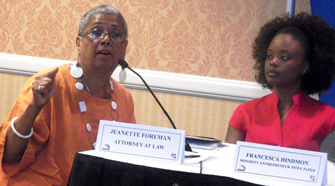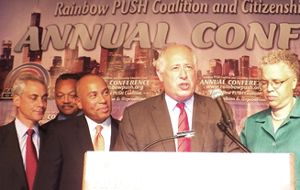Black-owned media suffering slow death, warn advocates
By Starla Muhammad -Staff Writer- | Last updated: Jul 26, 2012 - 5:50:50 PMWhat's your opinion on this article?

Jeannette Foreman, left, makes a point during media ownership discussion at 2012 Rainbow PUSH convention in Chicago. The number of Black-owned radio and TV
stations continues to dwindle, warned experts and advocates July 13. Photo: Starla Muhammad
|
Blacks own less than one percent of full power commercial television stations and less than three percent of commercial radio stations, yet make up nearly 14 percent of the total U.S. population.
Multi-media consolidation by huge corporate conglomerates, lack of access to capital and advertisers that do not target Black and minority stations are a few challenges making it tough to get a foothold in ownership.
Mr. Kizart related the fate of Inner City Broadcasting, a New York-based company founded in the early 1970s that recently shut its doors.
At one time, it was the largest Black owner of radio stations nationwide, co-founded by the late Percy Sutton. The company was a founding member of the National Association of Black Owned Broadcasters, which advocates for Black media ownership in television and radio.
“As of July 12 Inner City Broadcasting will not exist,” Mr. Kizart told conference attendees, during the July 13 session. “Why is Inner City Broadcasting gone? ... Entities like Clear Channel didn’t do African American ownership a favor by selling Inner City broadcasting three markets for almost $200 million at 20 times cash flow. They did the same thing with a number of other different minority owners because we’re so desperate to have the opportunity to own our properties. At the beginning of consolidation the Telcom Act of ’96, where that consolidation train just steamrolled, the only way we could get those opportunities to buy those properties was from these major consolidators,” he explained. “When they sold it to us, they sold them to us at incredibly inflated prices, at prices where we could not service the debt and what is happening now? Those same entities, the banks and the others, are taking (stations) back and as of right now the second largest African American-owned broadcast company is no longer here,” said Mr. Kizart.
Discriminatory practices in radio and television advertising, the bread and butter of media owners, is still prevalent, making it tough for owners to survive. No Urban, No Hispanic Dictates is the term advertisers and marketers use to rely their unwillingness to pay for ads reaching those audiences.
“That practice costs African American-owned and Hispanic-owned targeted properties conservatively about a quarter of a billion dollars a year,” said Mr. Kizart adding that a non-discrimination policy and a complaint review process has been signed onto by major ad industry players to address the problem.
Panelists pointed out the historic importance of Black media ownership and how it contributed to many “firsts” in the country. “There wouldn’t have been a Harold Washington without a WVON. There wouldn’t have been a David Dinkins in New York without a WBLS. There wouldn’t have been a W.W. Harrington, the mayor of Memphis without a WLOK,” said Mr. Kizart who has served in several advisory capacities with the FCC, the governmental regulatory body that controls media licensing, rules and regulations. He was referring to the election of Black mayors in cities with strong Black-owned radio stations.
Mr. Kizart currently serves on the FCC’s diversity advisory committee.
More opportunities for Black and Latino station ownership translates into more jobs and opportunities for those communities, he continued.

Rahm Emanuel, mayor of Chicago, left, joined Rev. Jackson for the Rainbow PUSH
Coalition conference. Gov. DeVal Patrick of Massacusetts, Illinois Governor Pat
Quinn, center, and Cook County Board President Toni Preckwinkle were among
politicians who participated in the July 10-14 gathering. Photo: Starla Muhammad
|
The current focus of the FCC committee is on what can be done cooperatively and collaboratively to address the dismal numbers of “minority” ownership, according to Mr. Kizart.
The high-jacking of Black images has been another casualty of the drop in Black media ownership.
Blacks are in trouble because for so long Black images have been controlled by other people, said Attorney Jeanette Foreman, who served as a panelist. Ownership means being better able to control images, said Atty. Foreman.
This is woefully missing today because of very little ownership and influence, noted several panelists, which also included, Joseph Miller of the Joint Center for Political and Economic Studies, Chanelle Hardy of the National Urban League Policy Institute, Joseph Torres of Free Press, Amalia Deloney of the Center for Media Justice, Francesca Hindmon, publisher of Minority Entrepreneur newspaper and Attorney Jocelyn James of the Minority Media Telecom Council.
Black-owned media is a critical “conduit of information” to the community from a Black point of view, noted Atty. Foreman. “When they found that out, however, that began the business of where we are now, why we’re in trouble, which is the consolidation of ownership of media,” she added.
There are a few bright spots, panelists noted. Bounce TV, the joint venture of former Atlanta Mayor Andrew Young and Martin Luther King III, and ASPiRE, launched by NBA Hall of Famer Ervin “Magic” Johnson were cited as relatively new Black-owned TV networks. Alterative media also provide avenues for ownership, said panelists.
Atty. Foreman said broadcasting on low signal radio is a way for Black and Latino communities to organize and get out their messages. She pointed to the success of a small community in Louisiana that united around such an effort. “It is an opportunity that if we took advantage of it, it would give us transformative powers to gather, to collaborate in ways that we don’t do now. It would give us accessibility to each other which we badly need. It would give us affordable ways that we’re now blocked from because so much of media is so expensive that we cannot get ourselves heard,” said Atty. Foreman.
“We need to all be very aware that every one of us on a mass scale needs to understand some of the media policies that put us in danger. Not only African Americans, but put our whole democracy in danger. Because we need to hear the proliferation of voices that are non-commercial, that have no interest except to tell the truth about what’s going on from many points of view,” said Atty. Foreman, also a board member of Prometheus Radio Project.
Rainbow Push is a non-profit founded by civil rights veteran Rev. Jesse Jackson, Sr. This year’s convention was held in downtown Chicago July 10-14 and at the group’s headquarters on the city’s South Side.
Sessions and workshops over five days covered an array of issues including, “Poverty in America-Town Hall Discussion,” “Advertising Data: The Key to Economic Growth and Development,” “Black and Brown in America,” an international plenary marking the 100 year anniversary of the African National Congress, alternative banking, voter suppression, health and nutrition, and the school to prison pipeline.
Presenters, participants and guests included Judge Greg Mathis, who has a popular syndicated TV show; Dr. Julianne Malveaux, noted economist and president emeritus of Bennett College for Women; Dr. Elise Scott, president and CEO of the Congressional Black Caucus Foundation; Thomas Perez, U.S. assistant attorney general of the Justice Dept. Civil Rights Division; NBA greats Earl “The Pearl” Monroe and Dominique Wilkins; Chicago Mayor Rahm Emanuel; Illinois Governor Pat Quinn; Massachusetts Governor DeVal Patrick and a host of other activists, experts, business and social leaders.
INSIDE STORIES AND REVIEWS
-
-
About Harriett ... and the Negro Hollywood Road Show
By Rabiah Muhammad, Guest Columnist » Full Story -
Skepticism greets Jay-Z, NFL talk of inspiring change
By Bryan 18X Crawford and Richard B. Muhammad The Final Call Newspaper @TheFinalCall » Full Story -
The painful problem of Black girls and suicide
By Charlene Muhammad -National Correspondent- » Full Story -
Exploitation of Innocence - Report: Perceptions, policies hurting Black girls
By Charlene Muhammad -National Correspondent- » Full Story -
Big Ballin: Big ideas fuel a father’s Big Baller Brand and brash business sense
By Bryan Crawford -Contributing Writer- » Full Story






 Click Here Stay Connected!
Click Here Stay Connected!








